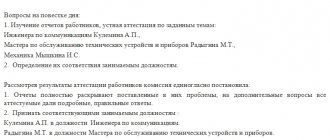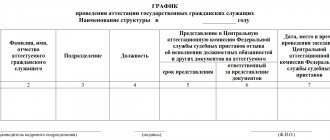General provisions
As one of the grounds sufficient for the employer to terminate cooperation with a specialist, the Labor Code names the employee’s inadequacy for the position held or the work he performs due to his insufficient qualifications, confirmed by certification results. This norm is established by Art. 81.
Job inadequacy is defined as the employee's inability to properly perform the assigned job. This is expressed in the fact that the work does not have a satisfactory result, labor standards are violated, the products of such a specialist, if he works at the enterprise, are completely defective.
However, insufficient qualifications are a reason for which, in essence, there is no fault of the employee, just as it is not his fault, for example, in his state of health. These two reasons are only a criterion by which one can judge that a person does not correspond to the position. Dismissal with this wording is not only a complex procedure, it is also quite dubious in a legal sense. To be legal, it requires compliance with a huge number of conditions and sufficient grounds in the order when dismissing an employee for inadequacy of the position held.
If you still plan to fire an employee precisely for this reason, then first determine the category to which he belongs. There are several groups of workers who cannot be fired for this reason. For example, according to Art. 261, it is impossible to dismiss a pregnant woman on this basis, except in cases where the enterprise is dissolved. That is, no matter how low the competence and qualifications of the expectant mother are, she will continue to work.
The management also cannot fire a specialist who has no experience for this reason, due to the fact that he has only recently worked. That is, a young worker, a specialist who came to production after training, as well as minors remain on the company’s staff, even if they lack qualifications. Moreover, a specialist cannot be fired, even if he does not have a diploma of special education, if by law it is not necessary to have one. However, if education is required, but the employee does not have it, and production suffers, then dismissal is quite possible. You also cannot fire someone who is on vacation or temporarily unable to work. This general rule from Article 81 is applicable in this case.
Inconsistency of the employee with the position held
Author: E. Nikitin
www.uhr.ru
If an employee is not suitable for the position he or she occupies, he/she will be subject to dismissal. In accordance with the Labor Code of the Russian Federation, there may be: 1) an employee’s incompatibility with the position held or the work performed due to health conditions in accordance with medical reports (subparagraph “a”, paragraph 3 of Article 81 of the Labor Code of the Russian Federation) and 2) an employee’s inconsistency with the position held or the work performed due to insufficient qualifications confirmed by certification results. We will consider all these cases in detail.
INCOMPATIBILITY OF AN EMPLOYEE WITH THE POSITION HELD OR THE WORK PERFORMED DUE TO HEALTH STATE IN ACCORDANCE WITH A MEDICAL CLINICAL
The Labor Code of the Russian Federation contains three grounds for dismissal related to the employee’s health condition: 1) the employee’s refusal to transfer to another job due to health conditions in accordance with a medical report (clause 8 of Article 77 of the Labor Code of the Russian Federation); 2) a state of health in accordance with a medical report that prevents the employee from occupying a position (performing work) provided for by the employment contract (subparagraph “a”, paragraph 3 of Article 81 of the Labor Code of the Russian Federation); 3) recognition of the employee as completely disabled in accordance with a medical report (clause 5 of Article 83 of the Labor Code of the Russian Federation).
The presence of three grounds for dismissal related to the employee’s health status causes difficulties in their application. When applying them, the following should be taken into account: firstly, if the employee’s health condition does not allow the employee to work at all, then dismissal must be made according to Art. 83 Labor Code of the Russian Federation; secondly, if the employee’s state of health does not allow the employee to occupy a position (perform work) provided for in the employment contract concluded with him, but at the same time does not prevent him from performing other work (as follows from the medical report), then the employer must transfer such an employee (from his consent) to other available work that is not contraindicated for him for health reasons (Part 2 of Article 72 of the Labor Code of the Russian Federation). The absence of such work or the employee’s refusal to transfer is grounds for his dismissal under clause 8 of Art. 77 Labor Code of the Russian Federation.
Thirdly, the necessary conditions for the application of subparagraph. "a" clause 3 of Art. 81 are as follows: an employee, in accordance with a medical report, is not directly contraindicated from performing the work stipulated by the employment contract, but his health condition prevents the proper performance of labor duties stipulated by the employment contract (for example, the employee does not
develops the established production rate, the quality of work performed decreases, etc.), i.e. the employee no longer corresponds to the position held or the work performed; the employer, due to the employee’s inconsistency with the position held or the work performed, does not consider it possible for the employee to further continue his previous job (fulfillment of job duties in the previous position) and offers another appropriate job, indicated to him for health reasons, if such work is available in the organization; the employee refuses to be transferred to another job or there is no such job in the organization.
An offer to an employee of another suitable job is made in writing and under his signature. The employee’s refusal of the proposed work is also documented in writing and signed by the employee.
An employee dismissed on the grounds provided for in subsection. "a" clause 3 of Art. 81 of the Labor Code of the Russian Federation, severance pay is paid in the amount of two weeks’ earnings (Part 3 of Article 178 of the Labor Code of the Russian Federation).
It is necessary to pay attention to the fact that, as follows from the content of draft federal law No. 329663-3 “On Amendments and Additions to the Labor Code of the Russian Federation”, adopted in the first reading, this basis for the dismissal of an employee at the initiative of the employer upon final adoption and entry into force this federal law will be excluded from the text of the Labor Code of the Russian Federation.
INCOMPATIBILITY OF AN EMPLOYEE WITH THE POSITION HELD OR THE WORK PERFORMED DUE TO INSUFFICIENT QUALIFICATIONS CONFIRMED BY CERTIFICATION RESULTS (subparagraph “b”, paragraph 3 of Article 81 of the Labor Code of the Russian Federation)
In labor legislation, qualification is understood as the level of preparedness, skill, and the degree of suitability of an employee to perform work in a certain position or profession, determined by rank, class, rank and other categories. The qualifications of a hired employee are established based on educational documents, as well as documents confirming the employee’s experience in the position (profession) for which he is hired. During the course of work, an employee’s qualifications are established through a procedure such as certification.
Certification is a test of a specific employee of an organization for professionalism and suitability for work in modern conditions.
The main objectives of certification are: 1) objective assessment of the activities of employees and establishment of their suitability for the position held; 2) assistance in improving the efficiency of the organization; 3) identifying prospects for using the potential capabilities of managers and specialists; 4) formation of highly qualified personnel of the organization; 5) ensuring the possibility of personnel movement; 6) stimulating the professional growth of employees.
Mandatory certification is established by special federal laws in relation to a small number of workers in certain categories and certain sectors of economic activity. These are: employees carrying out activities related to operational dispatch control in the energy sector; workers whose activities are related to the movement of trains and shunting work on public railway tracks; workers responsible for ensuring the safety of navigation; workers of hazardous production facilities; workers working at chemical weapons storage facilities and chemical weapons destruction facilities; aviation personnel; workers performing work with sources of ionized radiation; library workers; personnel of space infrastructure facilities; teaching and management staff of educational institutions; other workers.
Certification involves a differentiated approach to various categories of employees in accordance with the level of complexity of the tasks being performed or the job duties and responsibilities performed, contained in the employee job descriptions.
The main local regulatory act that determines the procedure for conducting certification of employees of an organization is the Regulations on Certification. The organization’s development of this provision is intended to detail the procedure for employee certification.
The following sections can be included in the Certification Regulations: 1) general provisions; 2) preparation for certification; 3) conducting certification; 4) assessment of the certified employee; 5) legal consequences of certification; 6) the procedure for considering labor disputes.
When developing it, it is necessary to take into account the provisions of the Resolution of the Council of Ministers of July 26, 1973 No. 531 “On the introduction of certification of managers, engineering and technical workers and other specialists of enterprises and organizations of industry, construction, agriculture, transport and communications” and approved in accordance with it Regulations on the procedure for certification of managers, engineering and technical workers and other specialists of enterprises and organizations of industry, construction, agriculture, transport and communications (Resolution of the State Committee on Science and Technology of the USSR and the State Committee for Labor of the USSR dated October 5, 1973 No. 470/267) .
Ancillary acts that ensure the organization and conduct of certification are the internal labor regulations of the organization, the Regulations on the structural divisions of the organization, and job descriptions of employees. To implement the stages and procedures of certification, orders from the head of the organization to conduct certification, reviews of the employees being certified, certification sheets, certification schedules for categories of employees and structural units, samples of minutes of meetings of the certification commission and other documents are required.
Certification can be carried out either planned, in accordance with the schedule approved by the certification commission or the head of the organization, or unscheduled, on the initiative of the employee himself or his immediate supervisor. The timing of scheduled certification of employees of organizations in various sectors of the national economy differs from each other, but, as a rule, certification of employees must be carried out at least once every five years.
To carry out certification it is necessary: 1) to form a certification commission; 2) draw up lists of those being certified and a schedule for their certification; 3) prepare the necessary documents for the work of the certification commission; 4) approve the prepared list of questions for certification tests.
The certification commission consists of a chairman, deputy, secretary and members of the commission. Its composition is approved by the head of the organization. He also approves the certification schedule, which is brought to the attention of each certified person no later than a month before certification. The schedule indicates the date and time of the certification, as well as the date of submission of the necessary documents for each certified person to the certification commission.
Certification in an organization can be carried out in several stages. For example, the first stage is testing; the second is an individual interview. The purpose of the first stage is to assess the employee’s preparedness in the field of professional knowledge based on the test results on the topics proposed in the tests. To implement this stage, the organization develops tests consisting of questions with alternative answers and tasks on professional topics. Tests should cover a wide range of issues and reflect all current changes and additions made to the current legislative and regulatory framework.
The certification commission establishes the number (or percentage of the total number) of correct answers, which determines the successful completion of certification testing by an employee of the organization. To recognize the test results as positive, the number of correct answers should not be less than 2/3 of the total number.
During an individual interview, a decision is made on the employee’s suitability for the position held.
In accordance with the Regulations on Certification, for each employee of the organization being certified, no later than two weeks before the start of the certification, the following documents are submitted to the certification commission: 1) a questionnaire characterizing the personality of the person being certified; 2) final sheet with test results; 3) a review of the employee subject to certification, signed by his immediate supervisor.
The review is the main document characterizing the level of the employee’s theoretical and practical skills, his personal and moral qualities and the correspondence of this level to the position held. The review should reflect not only general indicators characteristic of all categories of employees, for example, level of education, length of service in a given position, etc., but also the individual characteristics of the person being certified, for example, the degree of independence in the performance of job duties, the quality of their performance and responsibility for the assigned work, the ability to adapt to a new situation and apply new approaches to solving problems that arise, the ability to organize the work of subordinates, etc.
An individual interview is conducted in the presence of the person being certified and his immediate supervisor. If the person being certified does not appear at the meeting of the certification commission for unexcusable reasons, then the certification can be carried out in his absence.
The regulations on certification of various organizations contain the following list of indicators for assessing the qualifications of employees: 1) education; 2) work experience in the specialty; 3) professional competence; 4) work ethics, handling style; 5) ability to be creative, entrepreneurial; b) ability to carry out commercial activities; 7) ability to self-esteem.
The assessment of the professional qualifications of the certified employee is based on the conclusion about his compliance with the provisions of the job description, determining the share of his participation in solving the assigned tasks, the complexity of the work performed and its effectiveness. The results of the employee's certification are entered into the certification sheet.
Based on the results of the certification, in relation to each certified employee, the certification commission gives one of the following assessments: 1) corresponds to the position held; 2) corresponds to the position held, subject to improvement of work and implementation of the recommendations of the certification commission with re-certification within a specifically established period; 3) does not correspond to the position held.
The decision of the certification commission is documented in a protocol, which is signed by the members of the certification commission present at the meeting. Notification of the certification results must be given to the employee or sent by mail (registered mail) no later than five days after the day of certification, unless otherwise provided by the current document. An extract from the protocol of the certification commission is attached to the personal file.
Based on the results of the certification, the certification commission can submit the following recommendations for consideration by the head of the organization: 1) on encouraging individual employees for their successes; 2) on changing the size of their official salaries; 3) on the establishment, change or cancellation of bonuses to official salaries; 4) on inclusion in the nomination reserve; 5) about demotion or dismissal from a position; b) on improving the qualifications of individual employees; 7) on improving the performance of certified employees and the results of their work.
When issuing recommendations, the certification commission must indicate the reasons for which they are formulated. The results of the certification are reported to the head of the organization within a week after it is carried out.
The head of the organization, taking into account the assessments and recommendations of the certification commission, makes the following decisions: on rewarding individual employees for the successes they have achieved; on changes in official salaries for relevant positions; on changes or cancellations of bonuses to official salaries; about referral for advanced training; about promotion, transfer to another job and dismissal from work.
In accordance with part two of Art. 81 of the Labor Code of the Russian Federation, dismissal on the grounds provided for in paragraph 3 of Art. 81 of the Labor Code of the Russian Federation, is allowed only if it is impossible to transfer the employee with his consent to another job. Therefore, the order must contain an order to the personnel department to offer employees a transfer to other positions available in the organization. If the employee agrees to the transfer (such consent must be expressed in writing), a transfer order is issued. If the employee refuses the transfer or there is no other job in the organization, then an order for his dismissal is issued.
Regulatory legal acts defining the procedure for conducting mandatory certification provide that the head of the organization can make a decision based on the results of certification no later than two months from the date of certification of the employee. Thus, the Regulations on the procedure for certification of management, engineering and technical workers and other specialists of enterprises and organizations of industry, construction, agriculture, transport and communications establish that the head of an organization can decide to transfer an employee who, based on the results of certification, is recognized as not corresponding to the position held, within a period of no more than two months from the date of certification; If it is impossible to transfer the employee, the head of the organization may, within the same period, in accordance with the established procedure, terminate the employment contract with him.
After the expiration of the specified period, transfer of the employee to another job or termination of the employment contract with him based on the results of this certification is not allowed.
If, as a result of certification, a discrepancy is revealed with the position held (work performed) of an employee who is a member of a trade union, then his dismissal is carried out taking into account the reasoned opinion of the elected trade union body (Part 2 of Article 82 of the Labor Code of the Russian Federation). It should be taken into account that the employer has the right to terminate the employment contract no later than one month from the date of receipt of the reasoned opinion of the trade union body.
A different procedure is followed for the dismissal of employees who are heads (their deputies) of elected trade union collegial bodies of the organization, its structural divisions (not lower than shop units and equivalent to them), who are not released from their main work.
In order to dismiss the named employees due to inconsistency with the position held (the work performed), it is necessary to obtain the consent of the relevant higher elected trade union body (Article 374 of the Labor Code of the Russian Federation). In a similar manner, the dismissal of senior employees (manager, his deputies) of the elected trade union body of a given organization is carried out (Article 376 of the Labor Code of the Russian Federation).
In cases where the participation of an elected (corresponding higher elected) trade union body in considering issues related to the termination of an employment contract at the initiative of the employer is mandatory, the employer must, in particular, provide evidence that when terminating an employment contract with an employee due to his insufficient qualifications , confirmed by the result of the certification, to the certification commission during the certification, which served as the basis for the dismissal of the employee under clause. "b" clause 3 of Art. 81 of the Labor Code of the Russian Federation, included a representative from the corresponding elected trade union body (Part 3 of Article 82 of the Labor Code of the Russian Federation).
In the unified form of the order to terminate the employment contract (No. T-8), the line “Grounds” lists the documents on the basis of which the decision to dismiss the employee was made. First of all, this is an order from the head of the organization, issued based on the results of the certification. For completeness, you can indicate the details (date, number) of the decision (conclusion) of the certification commission.
In addition, if the employee was offered a transfer to another job and he refused, it is necessary to provide a link to the employer’s offer, as well as a document confirming the employee’s refusal of the offered job. If the organization does not have a job to which the employee can be transferred, then this fact must be recorded in the order issued based on the results of the certification. If the person being dismissed is a trade union member, the order must contain a reference to a document that sets out the opinion or consent of the elected trade union body (minutes of the meeting).
If an employee is dismissed, the order and work book indicate: “due to inadequacy for the position held,” if a worker, then “due to inadequacy for the work performed.”
Taking into account the above, an entry is made in the order: dismissed due to inadequacy of the position held due to insufficient qualifications, confirmed by the results of certification and refusal to transfer to another position, sub. "b" clause 3 of Art. 81 of the Labor Code of the Russian Federation. Reason: order to carry out measures based on the results of certification dated 10/05/2004 No. 150-k, minutes of the meeting of the certification commission dated 10/01/2004 No. 300, proposal for transfer to another job dated 10/06/2004, statement by I.I. . Ivanov on refusal to transfer to another job dated October 6, 2004. Based on the order, a corresponding entry is made in the employee’s work book
dismissal due to inadequacy of the position held
inadequacy for the position held
dismissal for inadequacy of the position held
https://youtu.be/SkyCi7I2qhU
Marriage and labor standards
Insufficient qualifications - this concept must have some kind of quantitative expression. For example, the lack of qualifications of a mechanic, assembler or blacksmith can be expressed in the fact that he allows systematic defects, or does not fulfill the norm. But then there must be clearly established standards and GOSTs by which this can be judged, and which do not contradict the law.
How to determine inconsistency in a profession whose results are not quantifiable, especially when it comes to clerks and people in intellectual professions? The products of their labor are not easy to detect, especially if the person performs job duties and does not violate the organization's routine. Here the quality of executed orders should be analyzed. If a person, in general, copes with them and has no complaints, it is almost impossible to justify his incompetence.
Offer another job
The Labor Code of the Russian Federation allows this dismissal with one fundamental reservation, whether the enterprise has another position suitable for this employee, and whether it was offered to him. Clause 3 of Article 81 states that such dismissal cannot be considered legal if the employee has not received such an offer, even if the new job is lower in position or less paid. In paragraph 31 of the Resolution of the Plenum of the Armed Forces of the Russian Federation dated March 17, 2004 N 2, it is stated that the directorate must provide evidence of the employee’s refusal to transfer to this position or the absence of a vacancy in such positions.
Here it should be clarified that the job must be suitable for the employee, that is, it is not enough to offer the secretary a position as an electrician if he does not have the skills or education for this. But if there were relevant positions, but they were abandoned, you can dismiss them. Moreover, the employee is not at all obliged to agree to it.
What is the inconsistency with the vacancy?
An employment contract between the parties can be terminated on the basis of clause 3, part 1, article 81 of the Labor Code of the Russian Federation - the employee’s incompatibility with the vacancy or the job function assigned to him due to a low level of qualifications or existing skills, subject to confirmation of this fact by a decision of a special commission. The initiator in this case is always the manager-employer.
The concept of qualification is enshrined in Article 195.1 of the Labor Code of the Russian Federation - this is the established level of knowledge, skills, abilities and experience that are necessary to perform the assigned labor function.
The characteristics of qualifications vary depending on the profession, position and are separately fixed in professional standards and special reference books.
Using reference books and standards as a basis, the employer creates job descriptions that set out the rights and responsibilities of a specific employee. They may also stipulate requirements for experience, education and other non-discriminatory requirements (clause 10 of the RF Armed Forces Resolution dated March 17, 2004 No. 2).
Regulations are developed for state and municipal employees in accordance with the requirements of various Federal Laws. The level of their performance is checked during certification and subsequently affects the final assessment based on the results of their activities.
It is important to note that dismissal for inadequacy of the position does not apply to pregnant women and women raising a child under 3 years of age, as well as employees on vacation or business trips (Articles 261 and 81 of the Labor Code of the Russian Federation).
Certification is a prerequisite in all cases, but it is divided into 2 types:
- Mandatory by law and established for certain categories of employees.
- Conducted by decision of the employer on the basis of adopted local regulations.
Regardless of the place of employment, dismissal for non-compliance with the position held, due to lack of experience or special education, can only be made by decision of the certification commission.
Union participation
The dismissal procedure becomes significantly more complicated in case of inconsistency with the position held, if a person who is a member of a trade union is dismissed, since Part 2 of Art. 82 of the Labor Code of the Russian Federation clearly stipulates the participation of an elected trade union body in this process. In this case, the procedure goes like this: the management sends a draft order and copies of documents that justify the decision to dismiss to the organization for consideration. From this moment on, the trade union body has a week to make a decision on this issue, justify its opinion and send it in writing to the employer.
If the employer does not consider the union's opinion motivated, he may not pay attention to it. Moreover, the article does not specify which opinion should be considered unmotivated. If the parties do not agree on their decisions, they must hold consultations within three days, the results of which are documented in the form of a protocol. If there is no agreement at this stage, the employer has 10 days to make a final decision, after which it is up to the state labor inspectorate. She may decide to reinstate the employee to his position.
Carrying out certification
The obligation to regularly conduct certification in private and commercial structures is not fixed anywhere - it all depends on the decision of management. However, in some organizations and for certain employees it is mandatory. For example, these include:
- employees of state and municipal institutions;
- teachers;
- employees of the RF Investigative Committee, Department of Internal Affairs, employees of the RF Prosecutor's Office;
- heads of unitary enterprises;
- persons working at particularly hazardous production facilities.
In these cases, all employees undergo regular certification, based on the results of which an appropriate decision is made. If the obligation to conduct certification is not established by Federal legislation, this issue is resolved by the employer independently.
In accordance with the provisions of Letter of Rostrud dated April 30, 2008 N 1028-s, certification for suitability for the position held upon dismissal due to insufficient level of skills or experience is mandatory, and without it the decision will be considered illegal.
If the organization’s local regulations do not establish a rule on regular certification, and the employee fails to cope with his job function and commits violations, the employer has the right to launch an unscheduled inspection.
When initiating certification by the employer, a special local regulatory legal act must be issued - Regulations on the conduct, which sets out the upcoming procedure. All employees must be familiar with this document against signature.
This Regulation should set out in as much detail and clearly as possible the criteria for certification to be carried out to assess the professional qualities of an employee. Ambiguous interpretation may cause disputes between the parties. If this condition is not met, the employee has a good chance to challenge the decision, citing bias and subjectivity.
The current legislation practically does not regulate the certification procedure itself. The law does not indicate: a list of decisions that can be made, persons exempt from participation and other important aspects. In practice, third-party experts and specialists may be involved, and working documents may be requested from the person being audited.
If there is a trade union, then its representative must be allowed to participate in the meeting of the commission (Part 3 of Article 82 of the Labor Code of the Russian Federation).
Based on the results of the meeting, the commission makes a decision and determines the compliance or non-compliance of the employee’s qualifications with the position held. Making a decision to dismiss an employee who has not passed the certification is the right, not the responsibility of the manager.
How to determine lack of qualifications?
For this purpose, there is a Qualification Directory of Positions (JSC), which is designed to systematize the work of personnel management and regulate labor relations. Of course, it does not have a verbatim listing of all modern positions, but using it involves drawing analogies between similar positions.
The use of the directory should be considered using specific examples. Let's say a secretary has been working at a company for two decades. At some point, the director orders him to learn a computer at his own expense and threatens him with dismissal for not having the appropriate qualifications. However, the secretary uses the computer quite successfully; he is only unfamiliar with some complex programs.
p>First, let’s figure out what exactly the position of this secretary is called, and what duties he must perform. The ECSD lists several secretarial positions. For example, the manager's secretary, according to the directory, must use a computer to present information to superiors, collect and process it, and also print for the manager. That is, the handbook does not specify which programs the secretary should use. Moreover, when applying for a job, the main requirement for someone working with a computer is knowledge of the MS Word package.
If a company, for some reason, decides to switch to other software products and needs retraining of personnel, then Art. 196 of the Labor Code of the Russian Federation clearly obliges the employer to retrain personnel for their needs and improve their qualifications. From this we can conclude that qualifications that were acceptable when the secretary was hired, and became insufficient over time, cannot unconditionally be considered a reason for dismissal. The employer has the right to improve this qualification not at the expense of the employee, but at the expense of the organization.
Basic provisions of the law
Dismissal due to inadequacy is possible when it becomes obvious to the employer that the employee does not have the proper skills and is not able to perform the work required of him at the required level.
A single identification of a case of poor quality work cannot serve as a basis for terminating the employment relationship. It is necessary to make sure that neither time nor the training received (if an employee is hired without experience) could improve the quality of performance of job duties. The most common reason for the intention to leave an employee is lack of education. If in a situation with dismissal at one’s own request or by agreement of the parties, the question of finding justification does not arise, then in the case of dismissal due to inadequacy of the position held, the question is more complicated. You will have to prove that the employer has legal grounds for such a conclusion.
Article No. 81 of the Labor Code of the Russian Federation in paragraph 3 provides clarification on this issue. All actions related to the dismissal procedure must be performed in strict compliance with the law.
In order to identify an insufficient level of qualifications, they are guided by the Qualification Directory of Positions, which was approved by the Ministry of Labor of the Russian Federation in 1998. By Resolution No. 9 of 02/09/2004, the Ministry of Labor of the Russian Federation explains that this reference book (ECSD) is intended to regulate labor relations and ensure the efficiency of personnel management.
Grounds for termination of the contract
According to clause 3 of Article 81 of the Labor Code of the Russian Federation, the employer has 2 reasons for unilateral dismissal due to non-compliance:
- Features of the state of health according to a medical report;
- Recognition of lack of qualifications after certification.
Depending on the basis, the process of parting with an employee and the calculation of final payments differ.
Employee certification
Certification is the most difficult, ambiguous and “slippery” moment of the procedure for dismissing an employee whose qualifications do not meet the required ones. The non-compliance must be proven by the certification commission, which is formed at the enterprise, and based on the results of the certification, it creates a special conclusion. The procedure for the creation and operation of the commission is approved by the directorate of the organization, if there are no special government acts regarding employees. For example, employees of unitary state enterprises are certified according to their own program, approved by the Government of the Russian Federation dated March 16, 2000 N 234 (SZ RF. 2000. N 13. Art. 1373). Civil servants go through it, guided by Decree of the President of the Russian Federation of 03/09/1996 N 353 (SZ RF. 1996. N 11. Art. 1036), etc.
The question of creating a commission is also ambiguous, the problem is who should participate in it? After all, non-governmental organizations often simply do not have provisions on the certification commission in their documentation, and without this it is impossible to create one. In addition, a small organization simply will not have specialists who could become members of this commission. For example, how to make a conclusion about the insufficient competence of an economist who is the only one on the company’s staff?
When considering a case in court, the question will arise: how could the members of the commission decide on its inconsistency if their own competence is lower than that of the defendant? A video engineer, electrician or system administrator can hardly judge the knowledge of an economist. Therefore, most likely such a commission will concentrate on the personality of the person being certified, complaints against him or other factors that are not the subject of discussion at the specialized commission. As a result of such a trial, a biased assessment of the employee’s qualifications will be established, which will make it possible to recognize its conclusions and decisions as null and void. However, upon dismissal, the inconsistency with the employee’s position in the document remains in the document, since the court cannot change it.
Of course, this does not apply to those cases when it is necessary to dismiss a law enforcement officer, customs service or civil servant for this reason. In this case, laws approved by the state apply, methods and clear regulations for the actions of the certification commission have been developed, since such employees undergo certification once every 4 years.
conclusions
- Dismissing an employee, even if he does not correspond to his position, (and especially an employee of a non-governmental organization) in compliance with all legal norms is a risky, time-consuming and partly futile matter, since it can be easily challenged legally.
- The decision to dismiss is ultimately made personally by the head of the company, therefore, he is fully responsible for it. Members of the commission who participated in the illegal dismissal cannot be held accountable.
- Since the incompetence of an employee is most often expressed in failure to comply with standards and production of defects, it can practically be regarded as a failure to fulfill labor duties. This is a disciplinary offense and, therefore, it falls under Art. 192 – 193 of the Labor Code of the Russian Federation on the imposition of penalties. An employee who has several penalties can be dismissed using clause 5, part 1, art. 81 Labor Code of the Russian Federation.
- For an employee who has a number of penalties, the employer can, out of a sense of humanism, give a choice between dismissal “under the article” or settlement “at will” (Article 78 of the Labor Code of the Russian Federation), especially since this option will be more gentle for both parties. The employee does not receive a stain on his reputation, and the employer avoids potential troubles and difficulties with the dismissal procedure.
https://youtu.be/Hmn6mNITVmI
ipinform.ru
How is the dismissal procedure carried out?
If a person working in a company cannot cope with the tasks assigned to him by his manager, then he can quit on the grounds that he is not suitable for the position he holds.
The process must be carried out by the employer in the correct sequence of actions:
- certification is carried out for a specific employee or all company personnel, for which the requirements and regulations of the law are taken into account;
- if the results of this procedure reveal that the employee really does not have the necessary qualifications, then the employer can offer him another position for which he has the necessary skills and abilities;
- another position is offered only if there are vacancies in the company;
- if there are no vacancies or the employee refuses the transfer, then the procedure for dismissing the citizen begins;
- the process is consistent with the trade union organization;
- an order for dismissal is issued by the employer;
- the necessary entry is made in the employee’s work book, as well as in his personal file in the company;
- on the last day of work, the citizen receives his work book and the required payments.
What to do if an employee is not suitable for his position? Answer in video:
Under such conditions, the employee is not paid severance pay or other payments.
He can only count on wages for the time worked, as well as compensation for vacation if the vacation was not used in full. If violations are discovered, the employee can challenge the dismissal in court.
What data is entered into the work book?
When dismissing a citizen who does not correspond to the position held, the necessary entry is certainly made in the work book. To do this, a link is placed to the required article of the Labor Code, and the date of dismissal is also written down.
How to write a resignation letter correctly? Read here.
Details of the order issued by the director of the enterprise are given. This document is signed by the director or other official with the necessary authority.







